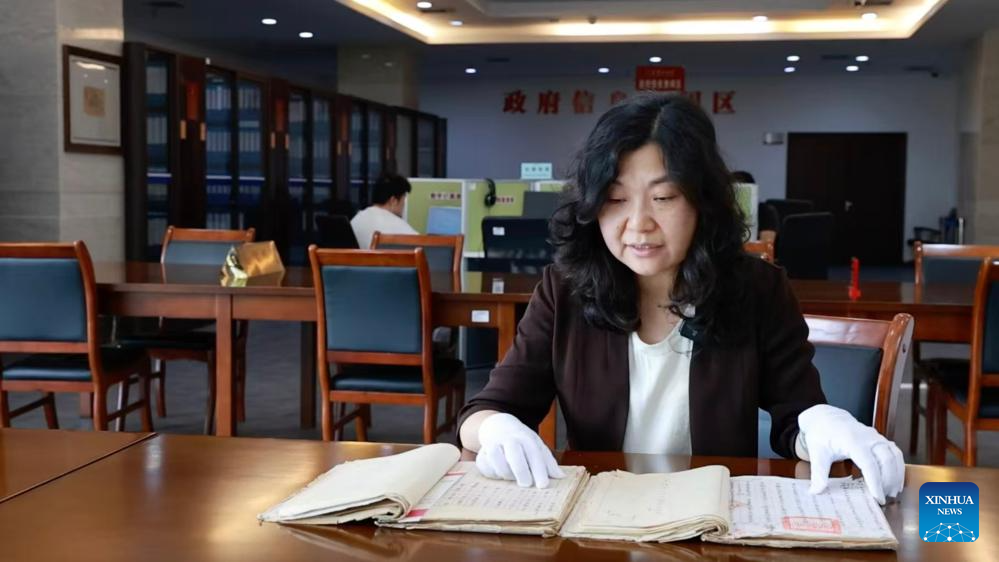Feature: Bond of patriotism across Taiwan Strait echoes through time
Source: Xinhua
Editor: huaxia
2025-10-25 10:04:45

Chen Feng, an official at the Fujian Provincial Archives, reads through archival documents on the Taiwan volunteer corps in Fuzhou, southeast China's Fujian Province, on Aug. 26, 2025. (Xinhua/Chen Wang)
FUZHOU, Oct. 24 (Xinhua) -- At 96, Zhang Xiuqing may have forgotten much of her past, but she can still hum the lyrics she sang as a young girl 80 years ago.
"Taiwan is our homeland, where five million people live without freedom; Taiwan is our homeland, where countless flowers bloom without fragrance...... We must reclaim our home......."
The lyrics are from the anthem of the Taiwan youth league, the youth branch of the Taiwan volunteer corps, a special anti-Japanese force formed by Taiwan patriotic compatriots, which was mainly active in eastern Fujian and Zhejiang provinces during the Chinese People's War of Resistance against Japanese Aggression.
Once a member of the Taiwan youth league, Zhang, along with her peers, sang the anthem and other patriotic songs, and performed plays to lift the spirits of soldiers on the front lines. She joined the league after Japanese troops invaded Fuzhou, Fujian. Her family had relocated from Taiwan to Fuzhou after Japan initiated a war against China and then occupied Taiwan.
For many years, the wartime experiences of Zhang and her fellow patriots remained little known to the wider public. But as a collection of 625 documents related to the Taiwan volunteer corps and its youth league was added to the latest edition of China's national documentary heritage list in June, more people can see the full stories.
In 1939, the Taiwan volunteer corps and the Taiwan youth league were founded by General Lee You-pang, a Taiwan-born patriot who had gone to the mainland in opposition to Japanese colonial rule on the island.
After starting out with just over 30 members, the Taiwan volunteer corps grew to more than 380 by 1945. It was the largest, most influential, and longest-lasting organization of Taiwan compatriots who directly took part in the War of Resistance against Japanese Aggression on the mainland, playing an active role in intelligence gathering, medical aid, and other areas along the front lines in Zhejiang and Fujian.
Containing historical photographs, telegrams, letters, newspaper materials and various other paper records, the archive chronicles the full history of the Taiwan volunteer corps.
"Each document is like a fragment of time. Through collecting and compiling them, we can piece together the shining chapter of Taiwan compatriots fighting to defend the motherland," said Chen Feng, an official at the Fujian Provincial Archives.
Chen, 51, has spent the past two decades collecting and compiling documents on the Taiwan volunteer corps. Since the launch of a systematic archival project in 2005, she and her colleagues have collected materials by visiting local archives and historical sites throughout Fujian, as well as interviewing veterans and their descendants.
Chen had conducted numerous projects during her nearly 30-year career, but she felt a special connection with this one. Born in the coastal area of Fujian, she had distant families living in Taiwan, just as many people in the province, a demonstration of the close bond between the two places.
"Every time I read through a newly collected document, I was always touched by those Taiwan compatriots' patriotism and then felt much closer to them spiritually," she said.
For example, Chen noted, two brothers surnamed Wang signed up to become the first batch of corps members in February 1939, and then their father and two other siblings joined the second batch just a month later.
"It shows that many Taiwan families joined the resistance against Japanese aggression together, from the elderly to young children," Chen said.
This is also the reason, she explained, that General Lee established the youth league at the same time he founded the Taiwan volunteer corps.
The youth league members, who were generally between eight and 14 years old at the time, displayed impressive patriotism in their writings preserved and collected by Chen and her colleagues.
In a journal published by the Taiwan volunteer corps, some of the young members wrote: "Because I didn't want to live as a little slave of a lost land, my mother and I came back to the motherland." "I hope every child in Taiwan can come and join us to fight against the enemy."
Chen also recalled a trip to northern Fujian, where she and her colleagues searched through thick grass and rugged mountain woods for a slogan reportedly painted by youth league members, as told by local residents.
After several hours of hard work, they finally spotted a line of red painted characters on a stone, reading "defeat the Japanese invaders and protect the motherland."
"The moment I saw it, I realized that even when taking a rest during a trip, the children never forgot to spread the message of resistance," Chen said.
Two years after the archival project started, a compilation of documents on the Taiwan volunteer corps was published in 2007. The collection and research, however, continue today, with more materials being gathered, preserved, and studied.
In Fuzhou, currently the capital city of Fujian Province, an exhibition hosted by the Fujian Provincial Archives opened in late August, featuring some 240 archival documents and historical photographs, about 30 of which are displayed for the first time.
Wang Yanghong, a descendant of a member of the Taiwan volunteer corps, donated some photos and family letters at the opening ceremony of the exhibition.
While visiting the exhibition, Wang unexpectedly came across a previously unknown document that listed the names of Taiwan compatriots who had signed up to join the force, including three from her family. She immediately took a photograph of the document to share with her family.
"I hope that these documents will allow more people to understand the deep bond across the Taiwan Strait," Chen said.
Zhang Xiuqing, who now lives in Fuzhou, still keeps a stack of letters and greeting cards sent from her youth league fellow members in Taipei.
A letter, dated October 2005, read: "Changing circumstances cannot sever the blood ties that unite us."
Zhang's son, Pan Bingzhao, said the family decided to donate three of his mother's letters from her fellow members to the Fujian Provincial Archives.
"The stories of compatriots from both sides of the Strait fighting shoulder to shoulder against Japanese aggression deserve to be known by more people," he said. ■



